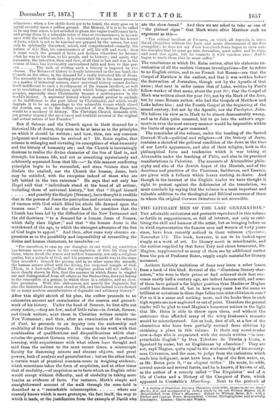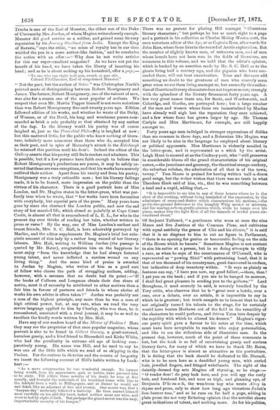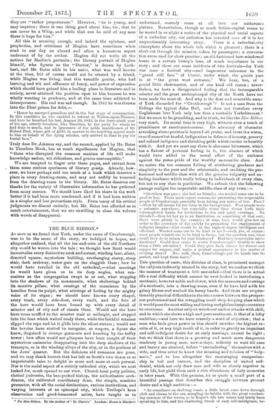THE LITERARY MEN OF THE LAST GENERATION.* THE admirable caricatures
and portraits reproduced in this volume so fertile in suggestiveness, so full of interest, not only as exhi- biting the skill and humour of the artist, but as bringing before us in vivid representation the famous men and women of forty years since, have been recently noticed in these columns (Spectator, November 15). The book, however, is not to be looked upon simply as a work of art. Its literary merit is considerable, and the notices supplied by that fierce Tory and clever hutnourist, Dr. Magian, supplemented as many of them are by additional matter from the pen of Professor Bates, supply ample material for literary comment.
Authors foolishly ambitious of fame may learn a sober lesson from a book of this kind. Several of the "illustrious literary char- acters," who were in their prime or had achieved their first suc- cesses nearly half a century ago, are indeed famous still, and some of them have gained a far higher position than Maclise or Maginu could have dreamed of, but in bow many cases has the name so brilliant or notorious in those days fallen into utter oblivion in ours? For us it is a name and nothing more, and the books then in such high repute are now neglected or out of print. Therefore the general reader will be glad to read Maginn's humorous notices in the light that Mr. Bates is able to throw upon them, and without the assistance thus afforded many of the witty Irishman's remarks would be misunderstood. Let us look, first of all, at a few of the obscurities who have been partially rescued from oblivion by obtaining a place in this volume. Is there any novel-reader now-a-days who is acquainted with the novels written "in irre- proachable English" by Don Telesforo de Trueba y Cozio, a Spaniard by name, but an Englishman by education? They are not, sayiiMaginn, quite equal to the workmanship of his country- man Cervantes, and the man, to judge from the caricature which made him indignant, must have been a fop of the first water, or, as Mr. Bates puts it, "an elegant trifler." He wrote, he adds, several novels and several farces, and he is known, if known at all, as the author of a comedy called "The ExquMitat" and of a life of Cortes and a History of the Conquest of Peru, which appeared in Constable's Miscellany. Next to the portrait of * A Gallery of Illtutrious Literary Characters (1830-18.18), Drawn by the We Daniel Mada'se, Rd., and accompanied by Notices chiefly by the late WUUam Maginn, LL.D. (Republished from Fraser's Magazine.) Edited by William Bates, RA., with a Preface and Copious Notes, Biographical, Critical, Bibliographical, and generally Illustrative. London : Omit° and Windus. Trueba is one of the Earl of Munster, the eldest son of the Duke ofC larence by Mrs. Jordan, of whom Maginn writescleverly enough. Munster did good service as a soldier, and gained some literary reputation by his Journey Overland from India. Except the King of Bavaria," says the critic, "no scion of royalty has in our time wielded the pen in a more author-like fashion," and he concludes the notice with an offer :—" Why does he not write articles for this our super-excellent magazine? As we have not yet the benefit of his hand, we have taken the liberty of inserting his head ; and as he is about making up his household, offer a page,— " To one who can right well pen, sword, or gun stir,
Colonel FitzClarence, Earl of song-famed Munster."
"Not the poet, but the author of Satan" was Christopher North's pointed mode of distinguishing between Robert Montgomery and James. The former, Robert Montgomery, one of the vainest of men, was also for a season one of the most popular of authors. We auspect that even Mr. Martin Tupper himself is not more notorious than was Robert Montgomery five-and-twenty years ago. Edition followed edition of his works, and whether he wrote of the Deity, of Woman, or of the Devil, his long and wearisome poems com- manded as brisk a sale probably as that obtained by any author of the day. In the literary world his poetry was of course laughed at, just as the Proverbial Philosrphy is laughed at now ; but this mattered little, for the public who knew nothing of litera- ture, infinitely more numerous than those who do, accepted him as their poet, and in spite of Macaulay's attack in the Edinburgh he retained this position until his death. Indeed the editor of the 'Gallery asserts that his poetry still finds readers and admirers. This is possible, but if a few persons have faith enough to believe that Robert Montgomery's productions are poems, it may be safely as- aerted that these are rare exceptions, and that his works have scarcely outlived their author. Apart from his vanity and from his poetry, Montgomery was a truly estimable man ; but his literary failings made, it is to be feared, more impression on the public than the virtues of his character. There is a good portrait here of Miss Landon, and Dr. Maginn states in the letter-press, what was per- fectly true when he wrote, that "her works have been favourites with everybody, but especial pets of the press." Many years have gone by since she charmed the London public, and now the sad story of her married life, which closed so painfully at Cape Coast Castle, is almost all that is remembered of L. E. L., for who in the present day ever thinks of reading her tales, whether written in prose or verse ? By the way, one of Miss Landon's earliest and truest friends, Mrs. S. C. Hall, is here admirably portrayed by Maclise, and the editor supplements Dr. Maginn's brief but eulo- gistic account of this lady by a rather long record of her literary labours. Mrs. Hall, writing to William Jerdan (the passage is .quoted by Mr. Bates), congratulates him on the happiness he must enjoy "from the knowledge that he had always fostered young talent, and never inflicted a careless wound on any living thing." And the !same kind of praise is awarded to Jerdan by Maginn, who writes of him as a good sort of fellow who cheers the path of struggling authors, adding, however, with a sarcasm that no doubt bad its point :—"If the books of Colburn and Longman obtain their due share of notice, must it of necessity be attributed to other motives than a fair bias in favour of partners and friends in whose choice of works his own advice is often taken ?" Jerdan was probably not a man of the highest principle, any more than he was a man of high critical power, but, at any rate, when we read the very severe language applied to him by Chorley, who was then, be it remembered, associated with a rival journal, it may be as well to recollect the kindly words written by Mrs. Hall.
Have any of our readers heard of the Mirror of Fashion? Here they may see the proprietor of that once popular magazine, whose portrait is also to be found in Gilbert Gurney, a good-natured, harmless gossip, and a kind friend to Bloomfield and Kirke White, who had the peculiarity in extreme old age of looking com- paratively young. His name was Hill, and he used to say he was one of the little hills which we read of as skipping in the Psalms. For the curious in dietetics and the secrets of longevity
we insert the following account of Hill's habits written by Lock- hart :— " As a mere octogenarian he was wonderful enough. No human being would, from his appearance, gait, or habits, have guessed him • to be sixty. Till within three mouths of his death he rose at five usually, and brought the materials of his breakfast home with him to the Adelphi from a walk to Billingsgate, and at dinner ho would eat And think like an adjutant of five and twenty. One secret was, that a ' banyan-day ' uniformly followed a festivity. He then nursed himself most carefully on tea and dry toast, tasted neither meat nor wine, and
wont to bed by eight o'clock. But perhaps the grand secret was the easy, imperturbable serenity of his temper."
There was no pretext for placing Hill amongst " illustrious literary characters ;" but perhaps he has as much right to a page and a portrait in his collection as Charles Molloy Westinacott, the once notorious editor of the Age, or as Captain Ross, afterwards Sir Johu Ross, whose fame lives in the record of Arctic exploration. But the number of slightly known men, of unknown men, and of men whose laurels have not been won in the fields of literature, are numerous in this volume, and we hold that the editor's opinion, which is backed by an assertion made by Mr. S. C. Hall as to•the giants living half a century ago, and the pigmies who have suc- ceeded them, will not bear examination. Time and distance add something no doubt to the greatness of men who scarcely seem great when we see them living amongst us, but assuredly this collec- tion of illustriousliterary characters does not impress us very strongly with the splendour of the literary firmament forty years ago. A few very great names there are, for Scott, and Wordsworth, and Coleridge, and Goethe, are portrayed here ; but a large number of the men and women whose faces are immortalised by Maclise have already well nigh lost the reputation they once achieved, and a few whose fame has grown larger by age. Mr. Thomas Carlyle and Miss Martineau, for example, are still happily amongst us.
Forty years ago men indulged in stronger expressions of dislike than are common in these days, and a Bohemian like Maginn was not likely to be nice in the language he employed about literary or political opponents. Miss Martineau is violently assailed in the letter-press, and is represented as a witch by the artist. Leigh Hunt is sneered at as the Cockney poet, who "still preserves in considerable bloom all the grand characteristics of his original career,—the jauntiness and greenery, the theatrical orange-suckery, the suburban relishes, the admiration of all that is of the town, towny." Tom Moore is praised for having written half-a-dozen good songs, but the writer wishes that there was no truth in what Theodore Hook said of him, viz., that he was something between a toad and a cupid, adding that,—
"It is impossible to see him in any of those houses where he is the show of the evening, without being reminded of the expression, by the admixture of creep-and-flutter which characterises his motions,—the go-by-the-ground deference to the haughty Whig master or mistress, and the soaring-soft-on-gentle-pinions which, while he hangs over his piano, makes him the light Eros of all the damsels of tender years cir- cumfused about."
Of Serjeant Talfourd, "a gentleman who woos at once the nine Muses and five Justices of the Common Pleas, and cultivates with equal assiduity the graces of Clio and his clients," it is said that it is no disgrace to him to cut no figure in Parliament, "there is no opening for genius or honourable feeling on the side of the House which he haunts." Sometimes Maginn is not content to aim his satire at a person, but in so doing attempts to vilify a race, as when he says of the countenance of O'Connell, who is represented as "pawing Shiel" with patronising hand, that it is that of ten thousand of his countrymen, good-humoured in surface, but indicative of deep treachery within. "It says as plainly as features can say, I have you now, my good fellow,—there, then ! I pat you on the back ; and if you are to be hanged to-morrow, I shall feel great pleasure in sending you to the gallows." Lord Brougham, it need scarcely be said, is severely handled by the Tory critic, who observes that he is "great over a bottle, over a case, over a debate, over an article, it is impossible to say in which he is greatest; but truth compels us to lament that he had not originally turned his talents to the stage, for he certainly would have beaten Mathews out of the field in the versatility of the characters he could perform, and driven Yates into despair by the rapidity with which he altered his dresses." Maginn's vigor- ous party spirit gave a flavour to his notes at the time, which must have been acceptable to readers who enjoy personalities, and like to see the ridiculous side of illustrious men. In the present day, however, much of the point of these comments is lost, but the book is so full of entertaining gossip and curious literary facts, for many of which we have to thank Mr. Bates, that the letter-press is almost as attractive as the portraiture. It is fitting that the book should be dedicated to Mr. Disraeli, who is to be seen here as a dandified young man, with curled hair, jewelled fingers, and fringed wristbands. The sight of the daintily-dressed fop sets Maginn off rhyming, so he sings :— " 0 reader dear! do pray look here, and you :will spy the curly hair, and forehead fair, and nose so high, and gleaming eye, of Benjamin D'Is-ra-e-li, the wondrous boy who wrote Alroy in rhyme and prose, only to show how long ago victorious Judah's lion-banner rose," and so he runs on for half a page, adding in plain prose the not very flattering opinion that the novelist shows great indications of talent, and nothing more. As for his politics,
they are "rather preposterous." However, "he is young, and may improve ; there is one thing good about him, viz., that he can never be a Whig, and while that can be said of any man there is hope for him."
All this is amusing enough, and indeed the opinions, and prophecies, and criticisms of Maginn have sometimes when read in our day an absurd and often a humorous aspect undreamt of by the author. Maginn did not write all the notices for Maclise's portraits ; the literary portrait of Maginn himself, who figures as the "Doctor," is drawn by Lock- hart, and Mr. Bates adds in his notes, what was well known at the time, but of course could not be uttered by a friend, while Maginn was living, that this versatile genius, who had learning and wit and affluence of fancy, and power of expression which should have gained him a leading place in literature and in society, never attained the position open to him because he was wholly wanting in prudence, and at the same time addicted to
intemperance. His end was sad enough. In 1842 he was thrown into the Fleet prison for debt,— Hence he emerged penniless and in the last stage of consumption. In this condition he was enabled to retreat to Walton-upon-Thames, and here he breathed his last, August 20, 1842, in the forty-ninth year of his age, utterly forsaken, like Sheridan, by the party for whom he had done so much, and in ignorance of the noble munificence of Sir Robert Peel, whose gift of £100, in answer to the touching appeal made to him on behalf of the dying scholar, only arrived in time to pay his burial fees."
Truly does Dr. Johnson say, and the remark, applied by Mr. Bates to Theodore Hook, has as much significance for Maginn, that "those who disregard the common maxims of life will make knowledge useless, wit ridiculous, and genius contemptible."
We are tempted to linger over these pages, and extract from them some curious specimens of literary gossip. Already, how- ever, we have perhaps said too much of a book which deserves a place in every drawing-room, and may not unfitly be removed from the drawing-room to the library. Mr. Bates deserves our thanks for the variety of illustrative information he has gathered from many sources. We should have liked his share in the work better if it had been more condensed, and if it had been written in a simpler and less pretentious style. From many of his critical 'judgments we dissent entirely, but Mr. Bates has afforded us so much entertainment, that we are unwilling to close the volume with words of disapproval.




































 Previous page
Previous page